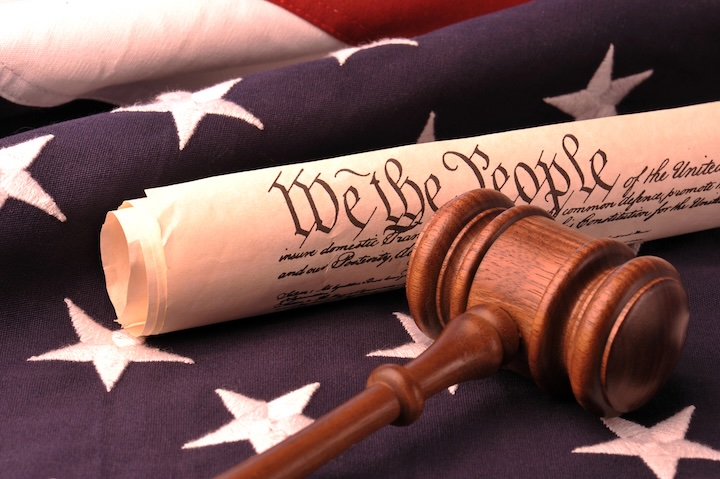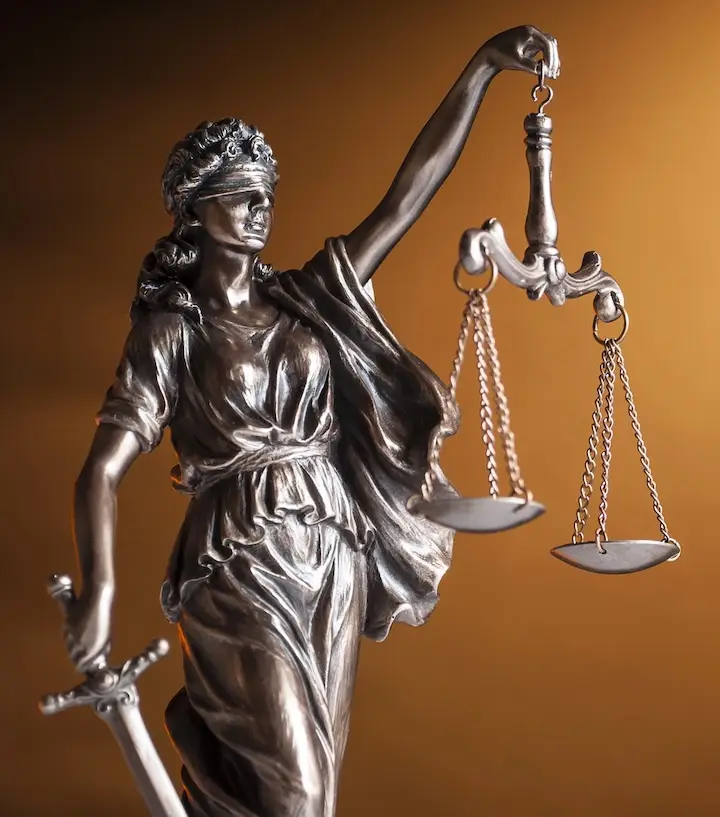By MIKE WILEY
Publisher
In the wake of the terrible assassination of Charlie Kirk, questions are again being raised about justice and forgiveness. The basic misunderstandings of what justice is, what purpose it serves, and how forgiveness fits into it, have led to countless miscarriages of both in recent decades.
Earlier generations of Americans had little difficulty grasping these concepts because they understood the moral framework behind them — something we have largely lost today. Now even police, lawyers, and judges often seem uncertain about these bedrock truths, to the great detriment of our society.
By the time you finish reading here, you will have a clearer understanding of what justice truly is, the purposes it serves, and how personal forgiveness relates to public justice.
Forgiveness vs. Justice
When the manhunt began for Kirk’s assassin, Utah’s governor reminded the public that the state still allows capital punishment. When the alleged killer was captured, he was charged with a capital crime. Yet at Kirk’s memorial service, his widow, Erika Kirk, movingly forgave her husband’s killer.
Many have asked: if she forgave him, shouldn’t society also forgive? Should the state now reduce his sentence? These questions expose a deep confusion. Once we understand what justice is, the confusion disappears.
Personal forgiveness does not cancel the need for public justice. Forgiveness frees victims from hatred and resentment — a moral and spiritual good — but it does not repair the damage crime inflicts on the larger community. The state’s duty is not emotional but moral and civic. It must protect society by vindicating and upholding the law.
We can see this clearly in theology. If divine forgiveness alone could remedy sin, then why did Christ need to suffer and die? Because sin is not merely a private wrong; it is rebellion against the moral government of God. The atonement satisfied the demands of divine justice so that forgiveness could be granted without weakening God’s moral authority. Sin could not simply be brushed aside. Justice had to be satisfied.
In the same way, civil governments cannot forgive crimes arbitrarily without undermining the moral structure on which law — and freedom — rests.
What Is a Crime?
A crime is an unlawful act committed not only against another person but against the community. The immediate victim bears the trauma and loss. Yet the ultimate victim is society itself — for every crime wounds the public order.
Law is the foundation of civilization. It defines which behaviors are prohibited and, by implication, which are acceptable. These laws reflect the moral boundaries that safeguard our common life. If those boundaries are ignored or unenforced, society unravels.
Before we define justice, we must clear away a common misconception.
Justice Is Not Vengeance
Justice is not revenge — not for victims and not for society. In places without functioning law, revenge quickly becomes the driving impulse, and chaos follows. Revenge is subjective and emotional; justice must be objective, rational, and measured.
In a lawful society, the victims of crime renounce personal vengeance and entrust justice to the state, which acts on behalf of the community. The purpose is not emotional satisfaction but the restoration of moral order.

What Justice Is
Justice is society’s means of repairing the moral injury caused by crime. It protects the community from sliding into lawlessness by imposing proportionate sanctions on wrongdoers. These sanctions are not cruel or arbitrary — they are the visible proof that the law still stands and that right and wrong still matter.
To see this more clearly, consider again the assassination of Charlie Kirk. His family and friends are the immediate victims, but society itself — the people who rely on law to protect life and liberty — is the ultimate victim.
Albert Barnes, in his classic work The Atonement, laid out five purposes of justice, which, though written in a theological context, apply powerfully to human law as well.
The Five Purposes of Justice
1. To Restore the Authority of the Law
Our highest civic value is the right of every person to live out their life free from murder. Closely bound to it are the freedoms of speech and assembly. These are not abstract ideals; they are protected by law.
When a criminal violates those laws — especially through an act of murder meant to silence a voice — he attacks not only a person but the very foundation of civilization. He declares, “I will not live by your rules.” Such defiance tears at the fabric of lawful order.
Law must be respected, or it loses its force. Every unpunished crime erodes confidence in justice. We’ve seen this in modern cities where leniency toward theft or violence has led to rampant lawlessness and the flight of businesses. When law is mocked without consequence, chaos follows.
The first purpose of justice, then, is to restore the honor and authority of the law as if it had never been violated. Punishment — proportionate and fair — reaffirms that the law is real, valuable, and binding.
As Albert Barnes wrote, justice must make a public demonstration that the law still commands reverence. Only by visible sanction does the law retain moral power.
Justice must also be measured. A minor offense cannot merit a severe penalty, and a grave crime cannot be treated lightly. True justice weighs evidence impartially — hence Lady Justice’s blindfold and balanced scales. Her sword signifies the state’s authority to punish the guilty.
As one leading criminal justice philosopher argued: “A failure to terminate a murderer’s life is not a celebration of human life, but exactly the opposite… A society that punishes a murderer by giving him a jail sentence of one week is a society that sets little store by human life.”
A society that values life must be willing to defend it with firm and proportional sanction.
2. To restore the authority of the lawgiver
Every lawbreaker not only defies the law but also the lawgiver. In effect, he says, “You have no right to rule me.” In the United States, the ultimate lawgiver is “We the People.” To violate just laws is to rebel against the collective moral will of the people themselves.

If such rebellion goes unanswered, the authority of the government — and of the people — is weakened. Justice, by punishing the offender, restores the dignity and sovereignty of the lawgiver. It declares that lawful authority still governs.
3. To secure the safety of the community
Justice also protects the public. By removing or restraining those who defy law, it ensures the safety of others. When offenders are released without consequence — as in jurisdictions that have abolished cash bail or decriminalized theft — crime flourishes, and the innocent suffer.
Public justice must be protective as well as corrective. Mercy that endangers others is not mercy at all.
4. To Tend Toward the Reformation of the Wrongdoer
Justice also seeks, where possible, to reform. The experience of sanction — of facing the real cost of one’s actions — can awaken moral awareness. Punishment is not intended to destroy but to discipline; not to brutalize but to sober the conscience.
While not every offender will reform, the prospect of real consequences is the surest restraint upon evil.
5. To enhance the standing of the lawgiver
Finally, when justice is carried out in a way that is fair, objective, and measured, it strengthens public confidence in the lawgiver. In America, that means renewed faith in self-government.
When the people see that justice is even-handed — blind to wealth, race, or power — they regain respect for the system that represents them. But when justice becomes political or sentimental, the moral standing of the state crumbles.
What about “an eye for an eye”?
Critics often cite Jesus’ words — “You have heard it said, ‘An eye for an eye, and a tooth for a tooth’… but I say to you, do not resist him who is evil” — as proof that retribution is wrong.
But context is key. In the Sermon on the Mount, Jesus was addressing ordinary individuals, not magistrates. He was correcting the misuse of the lex talionis — the law of equivalent punishment — as a license for private revenge.
The Old Testament principle of “an eye for an eye” was not barbaric but restraining — it limited punishment to equivalence. That standard still underlies modern justice: penalties should be proportionate to offenses.
We no longer take literal eyes for eyes, but we still seek measured equivalence — a prison sentence fitting the harm inflicted. When punishment matches the gravity of wrongdoing, justice is served for both victim and community.
Forgiveness and Public Duty
Erika Kirk was entirely right to forgive her husband’s murderer on a personal level. That act of grace honors God and liberates her from bitterness. Yet her forgiveness does not remove the state’s obligation to uphold justice.
Private forgiveness and public justice operate in different realms. One heals the heart; the other preserves the order required for civilization. Society cannot “forgive” murder without consequence any more than God could forgive sin apart from the atonement.
The cost of misunderstanding justice
When modern society confuses compassion with indulgence, or forgiveness with the suspension of justice, it invites anarchy. Where the law is not respected or feared, it will not be obeyed.
We see this in many cities today: criminals act without fear, victims lose faith in the system, and citizens retreat from civic life. This is not mercy — it is the slow death of ordered liberty.
Justice requires that wrongdoers be sanctioned in a way that is fair, objective, and measured — neither vengeful nor permissive. Without that sanction, law loses its moral force, and government its legitimacy.
Forgiveness is a virtue of the heart; justice is a duty of the state. The health of civilization depends on knowing the difference.
Closing reflection
Theologian Albert Barnes saw this clearly more than a century and a half ago. In both heaven and earth, law must be vindicated. Without sanction, mercy becomes weakness; without justice, forgiveness becomes sentiment.
If God Himself would not forgive sin without satisfying justice through the Cross, how can any earthly government presume to do less?
To pardon without principle is not compassion — it is abdication. To punish rightly is not cruelty — it is fidelity to truth.
When law is upheld, the community is safe, the conscience is instructed, and mercy has meaning. When law is mocked, chaos follows — as we now see in cities where crime is excused and criminals emboldened.
True justice does not seek revenge. It seeks restoration — the restoration of law’s honor, the protection of the innocent, the reformation of the guilty, and the vindication of the moral order itself.
Only when justice fulfills these ends can a society stand. HVN

